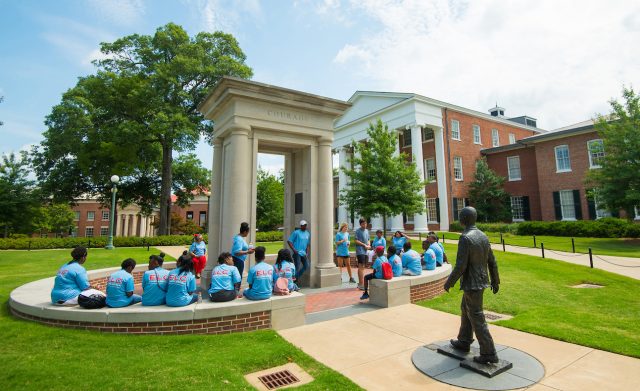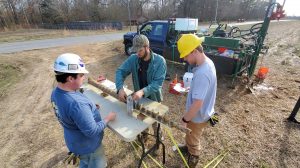
Archive Photo: Middle school students from Charleston visit the UM campus to culminate the monthlong Entrepreneurial Learning Center summer program. Photo by Kevin Bain/Ole Miss Digital Imaging Services
OXFORD, Miss. – After a two-year collaboration between community members and faculty, staff and students from the University of Mississippi, the M Partner initiative has made a difference in the physical appearance, educational attainment and health status of the Charleston and Tallahatchie County communities.
The university launched M Partner, a community engagement effort that seeks to improve life in Mississippi communities, in 2018. M Partner offers a framework for community and university representatives to pair university resources and expertise with priority projects in partner cities across the state, and supports institutional efforts to promote healthy and vibrant communities.
The inaugural M Partner communities were Charleston, Lexington and New Albany. In Charleston, M Partner led to 15 academic courses and internships, seven special programs and events, a new partnership established through the North Mississippi VISTA Project, and the involvement of 180 UM students.
These collaborations have promoted economic revitalization and development, and educational enrichment, as well as improving health status.
“There is no greater feeling as mayor than to be granted an opportunity to enhance the quality of life for every citizen in your community,” Charleston Mayor Sedrick Smith said. “The collaboration with M Partner has proven to be a huge success for the city of Charleston.
“We appreciate M Partner’s commitment to jointly research, develop and advance the understanding of cities while formalizing a relationship and successful partnership.”
Economic Revitalization and Development
The Charleston Main Street Association emerged as a strong partner for the university’s McLean Institute for Public Service and Community Engagement during the summer of 2019.
Two M Partner interns, Nala Crumb, of Walls, and Gabriela Wells, of Pascagoula, helped Norma Platt, the association’s new director, launch the Main Street Reimagined campaign. The team developed connections with local business owners and secured donations of exterior paints and brushes to repaint building facades on the Courthouse Square and Main Street.
The campaign soon took on a life of its own. Business owners saw their neighbors making strides to stage window displays and upgrade their exteriors, and many began to take initiative to complement and enhance the association’s efforts. By the end of summer, planters were in bloom throughout the downtown area, and residents could sit on new benches to admire the transformation.
“Launching the Main Street Reimagined campaign was an exciting challenge,” Platt said. “The end result brought such light and beauty to Charleston’s Main Street, which was admired by all. One business owner stated it felt like being in another city!”
Navodit Paudel, a CEED Innovation Scholar and UM Hall of Fame student from Dhading, Nepal, also completed an M Partner internship to develop content for an enhanced website and social media presence for the city of Charleston.

Archive Photo: Graduate students in the UM Department of Geology and Geological Engineering work on drilling at one of about 20 sites to create a geologic map of the Charleston Quadrangle. Submitted photo
The partnership-building momentum continued on campus as well, incorporating new disciplines with the potential to accelerate economic development. Ron Counts, a research assistant professor of geology and geological engineering, talked with the mayor and the Main Street Association director to set up drilling at some 20 sites in the Charleston quadrangle to create a 1:24,000-scale geologic map.
Cost-benefit analyses of geologic maps suggest that the map could generate between $3.1 million to $4.8 million over the next two decades. More immediately, the maps can be used to identify gravel deposits that can be commercialized to create jobs and build the local tax base.
Educational Enrichment
Quality education was a resounding area of emphasis among participants in a community meeting to identify priorities for M Partner. Community members expressed a desire to improve educational outcomes and job prospects in Charleston so that talented youth would not have to leave the community to advance their career ambitions.
Enhancing programs and partnerships of the Tallahatchie County Library was central to this vision of supporting educational achievement and enrichment. To further these goals, Stephen Lenz, associate professor of leadership and counselor education, taught a doctoral-level Advanced Assessment and Evaluation course that collected data and conducted asset mapping to aid the library’s planning efforts.
Building on local interest in summer enrichment and long-term job creation opportunities, the McLean Institute used student interns in its CEED initiative to lead a monthlong Entrepreneurial Learning Center. Working with a VISTA summer associate also assigned by the McLean Institute, the CEED students developed a curriculum for local middle school students that taught an entrepreneurial approach to problem solving by introducing content in wellness, business formation and creative writing.
The students worked closely with the university’s Center for Innovation and Entrepreneurship to develop the programming.
“My time in Charleston is time that I will cherish forever,” said Kendall Walker, of Tupelo, who graduated in May with a degree in communication sciences and disorders. “I’m thankful to the CEED Initiative and the (National Charleston Day Organization) for allowing us to come in and cater to the youth of Charleston during the monthlong Entrepreneurial Learning Center.
“This experience allowed me to grow create real change in the community. At the end of our monthlong ELC, our students presented their personalized business plans to their family, community members, friends and university members. We passed down what we learned to a local scholar so that the program could sustain in the hands of the local community.”
The emphasis on writing developed into another partnership with the UM Division of Outreach and Continuing Education in 2020. With support from the McLean Institute and M Partner, staff in the Office of Pre-College Programs worked with the National Charleston Day Organization to create a writing and community engagement program for high school students and UM mentors who will act as advisers and editors.
Charleston high school students participated in workshops to improve their skills in writing and technology, learn public speaking skills, and familiarize themselves with college life. They toured the university’s new Virtual Reality Learning Center and experienced virtual reality applications that placed them on the moon and inside the human body. The center is housed in the Innovation Hub at Insight Park, where technology and research-driven start-ups work with UM’s business accelerator.
The goal of this broad exposure, both in the community, on campus and in the entrepreneurial space, combined with a sense of closeness and affinity with college students, is to give the high school students in Charleston confidence to pursue higher education.
“We are so thankful to the wonderful people in Charleston for allowing us to partner with such talented organizations in Tallahatchie County,” said J.R. Love, McLean Institute project manager. “Advancing economic development in Mississippi and engaging with our communities across the state are vitally important to the work of the McLean Institute and the CEED initiative.”
Improving Health Status
The launch of the M Partner initiative in Charleston provided an opportunity to deepen campus partnerships in the community. Evi Addoh, of Delta State, Nigeria, served as a 2019 M Partner intern with the James C. Kennedy Wellness Center, where she developed diabetes education content and drew on her training as a dentist to deliver a workshop on diabetes and oral health.
Leigh Ann Ross, professor of pharmacy practice and associate dean for clinical affairs in the School of Pharmacy, and Lauren Bloodworth, clinical associate professor of pharmacy practice, began collecting data to support wellness center programming and interventions on diabetes and obesity. They also conducted an opioid summit with 120 first responders and health care professionals, who participated in a pharmacist-led training on recognizing opioid overdose and proper administration of naloxone.
“Working with UM and the M Partner Initiative was an incredible experience for our community,” said Catherine Moring, the wellness center’s executive director. “It allowed the opportunity for students and faculty to have real impact off campus and enabled our community to benefit from the university’s presence.
“We built great relationships with faculty from a few departments and look forward to continued work together even after M Partner ends.”
M Partner aided the development of partnerships with the Department of Leadership and Counselor Education and the Department of Public Policy Leadership.
Richard Balkin, professor of leadership and counselor education, worked with doctoral students to adapt a life balance survey to collect data at the annual Tallahatchie Wellness Health and Lifestyle Fair. The survey responses were used to recommend actions to support protective factors such as positive orientation, quality of relationships and spiritual support, and to explore risk factors such as stress and anxiety, sleep disturbance, sex and intimacy, career satisfaction and global health.
In the Department of Public Policy Leadership, Jody Holland, associate professor, and Nidhi Vij, assistant professor, worked to strengthen the operations of the James C. Kennedy Wellness Center.
Holland worked with a team of undergraduate researchers to conduct an organizational assessment, leadership and program evaluation. Vij connected undergraduate courses in public policy and quantitative analysis and public policy design and analysis to develop a model for how telehealth can be expanded to Tallahatchie County and surrounding areas to enhance existing levels of care.
The final report will consist of a financial feasibility analysis and research proposal to expand telehealth in the region. This represents an opportunity to attract investments from a range of sources to use technology to reach vulnerable community members, the urgency of which has been made evident by the increased reliance on telehealth as part of the response to COVID-19.
“M Partner presented a tremendous opportunity to elevate the work that the McLean Institute was already doing in Charleston,” said Laura Martin, M Partner director and associate director of the McLean Institute. “We were able to make new connections in the community and find new collaborators on campus.
“It was an honor and a privilege to be part of the innovation and revitalization taking place in Charleston, and we are grateful to all who contributed to the successes of the pilot phase.”